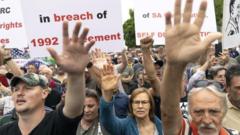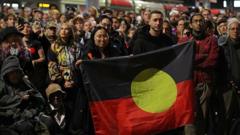In a groundbreaking decision, the South African court ruled against the notion of a white genocide in the country, characterizing the claims as "clearly imagined" and fundamentally "not real". This ruling emerged amidst a case where a wealthy benefactor's attempt to fund a white supremacist organization, Boerelegioen, was blocked. Grantland Michael Bray's endeavor to donate $2.1 million to the group aimed at furthering its agenda of racial hatred and separation was deemed invalid by the court due to its vagueness and contradiction to public policy.
South African Court Rejects White Genocide Claims in Landmark Ruling

South African Court Rejects White Genocide Claims in Landmark Ruling
A recent court ruling in South Africa has dismissed claims of a white genocide as fictional, challenging the rhetoric used by prominent figures such as Donald Trump and Elon Musk.
The court noted that Bray's obsession with an impending genocide was fueled by an underlying racism and exposure to incendiary online content. He had previously allocated significant funds to Boerelegioen, believing it necessary for defending against a fabricated narrative of a genocide against white individuals in South Africa. Judge Rosheni Allie underscored that the intentions behind Bray's bequest were vague and primarily driven by unfounded fears of racial extermination.
The decision also reflects a broader context in which figures like Trump and Musk have spotlighted the status of white farmers in South Africa, despite evidence suggesting that crime rates impacting this demographic are comparatively low. Local statistics indicate a grim reality where the majority of violent crimes are not racially driven but instead impact various communities across South Africa. Ultimately, the case highlights the fallacies of racial victimhood narratives, bringing to light the persistent complexity of racial issues in the nation.
In summary, the South African court's dismissal of white genocide claims sends a strong message against racial extremism and affirms a commitment to denouncing unfounded ideologies that promote division and hatred.
Judge Allie ordered Boerelegioen to bear the legal costs, emphasizing that their purported mission contradicted the courtroom's findings and echoed the wider societal commitment to combat racism in all forms.
The decision also reflects a broader context in which figures like Trump and Musk have spotlighted the status of white farmers in South Africa, despite evidence suggesting that crime rates impacting this demographic are comparatively low. Local statistics indicate a grim reality where the majority of violent crimes are not racially driven but instead impact various communities across South Africa. Ultimately, the case highlights the fallacies of racial victimhood narratives, bringing to light the persistent complexity of racial issues in the nation.
In summary, the South African court's dismissal of white genocide claims sends a strong message against racial extremism and affirms a commitment to denouncing unfounded ideologies that promote division and hatred.
Judge Allie ordered Boerelegioen to bear the legal costs, emphasizing that their purported mission contradicted the courtroom's findings and echoed the wider societal commitment to combat racism in all forms.




















